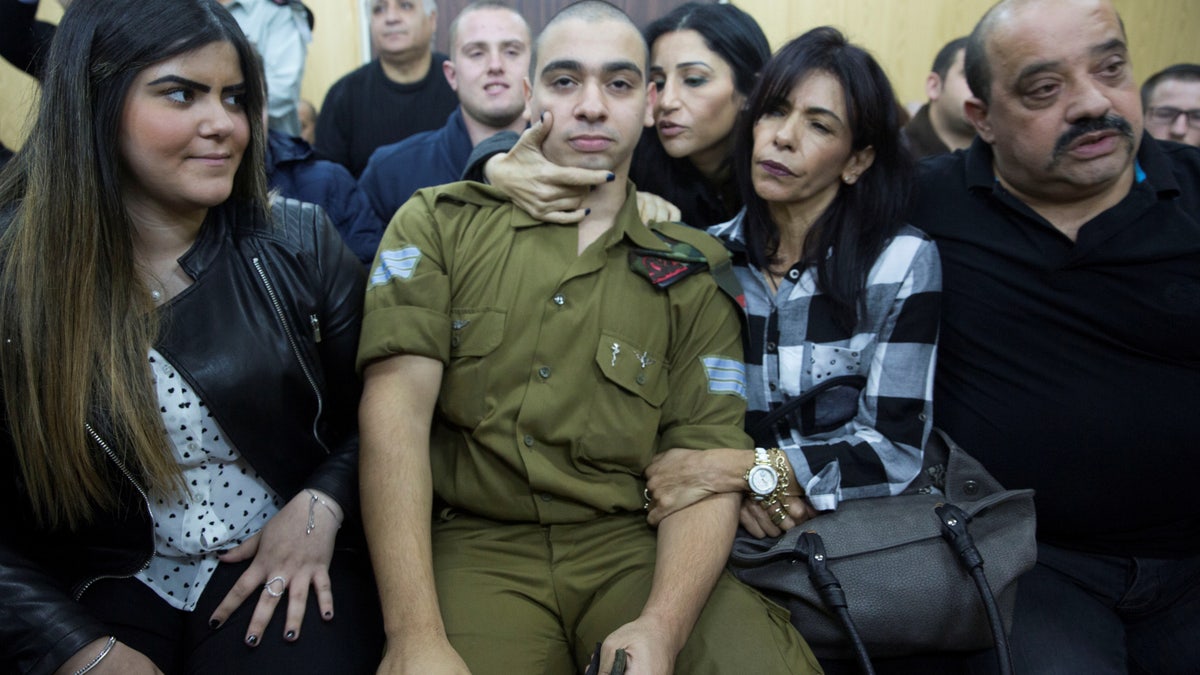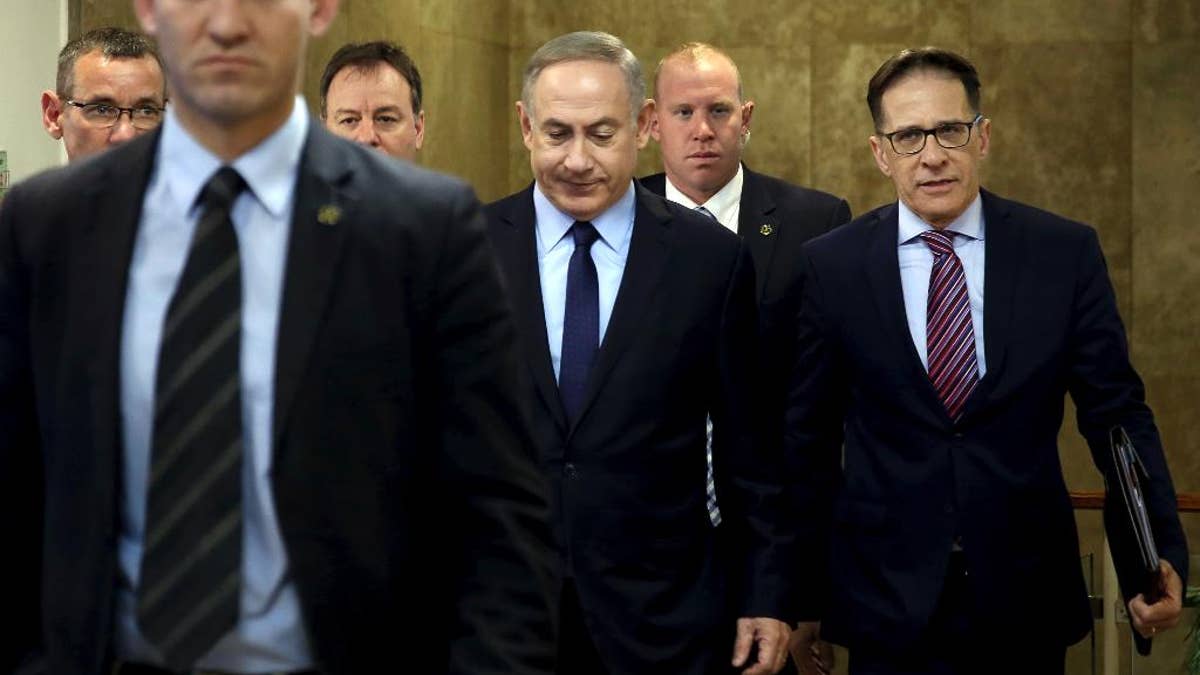
Israeli soldier Elor Azaria, center, sitting to hear the verdict on Wednesday. (REUTERS/Heidi Levine/Pool)
Israeli Prime Minister Benjamin Netanyahu on Wednesday called for a pardon of the Israeli soldier convicted of manslaughter for shooting a knife-wielding Palestinian attacker in the head, in a case that has deeply divided the country.
Sgt. Elor Azaria, an Israeli army medic who had been deployed to the West Bank at the age of 19, shot and killed the Palestinian attacker who lay wounded and motionless on the ground -- nearly 15 minutes after he tried to stab a soldier in Hebron. Azaria's supporters claimed the military made him into a scapegoat.

Israeli Prime Minister Benjamin Netanyahu, center, on Sunday. (Gali Tibbon/Pool photo via AP)
The country's president, Reuven Rivlin, has authority to issue pardons but has said he would wait for the legal process to run its course before making a decision.
ISRAEL DISPATCHES SPY CHIEF FOR SECRET MEETING WITH TRUMP
"I urge the people of Israel to support The Israeli Defense Forces. The soldiers are our daughters and sons," Netanyahu wrote on Facebook.
The three-judge panel ruled earlier Wednesday, "He opened fire in violation of orders, the terrorist did not pose any threat."
In delivering her ruling, Col. Maya Heller systematically rejected all of Azaria's defense arguments. “There is no question that the defendant shot from close range after aiming his gun at the terrorist’s head and there is no dispute that by doing so he endangered the lives of those around him,” she wrote.
ISRAELI MOSSAD LOOKING FOR A FEW GOOD WOMEN
The judges added that Azaria was "aware" his actions would result in the loss of life, and it was his bullet that killed the wounded Palestinian. Despite Azaria's supporters claiming senior Israel Defense Forces leaders, politicians, the media or public opinion could influence the ruling, Heller emphasized that "the verdict is based solely on the evidence brought forth (in the trial)."
Azaria’s parents, Charlie and Oshra, left their home in Ramla in the early morning and arrived at the court for the verdict, greeted by hundreds of people who had turned up to stand in solidarity with the IDF sergeant.
As Azaria entered the courtroom, people nearby clapped their hands while calling out expressions of support: “We love you and God loves you,” they shouted.
Azaria's defense team vowed to take the case to the military court of appeals. This could drag the trial out for at least four more months and even longer if another appeal is filed to the Supreme Court.
Many Israeli lawmakers, both from the left and the right, called to pardon Azaria. Some claimed the legal process against him was "contaminated from the onset." According to Jewish Home party leader Naftali Bennett, "today a soldier was convicted like a criminal for killing a terrorist who tried to slaughter soldiers."
Defense Minister Avigdor Lieberman responded, "This is a severe verdict. I ask we all respect the court's ruling and show restraint. What is important – despite the harsh verdict – is that the defense establishments help the family and this soldier. I call on the public not to lambaste the IDF and the defense establishment. We must respect the ruling."
During the verdict reading, which lasted two and a half hours, violent fights started outside of the court, and hundreds of right-wing demonstrators who supported Azaria blocked one of the main roads in Tel Aviv. Police arrested two people.
The shooting, which took place in the morning hours of March 24, 2016, and the tense moments leading up to it, were captured on video by a Palestinian human rights activist. The video footage, distributed to news organizations, ensured that the incident, which came amid a wave of Palestinian stabbings, drew international attention. Azaria was indicted on April 18 by the military court.
In the face of strong condemnation of Azaria’s actions by top military brass including IDF Chief of Staff Gadi Eisenkot and then-defense minister Moshe Ya’alon, far-right supporters and some politicians have accused the defense establishment of abandoning one of its own.
Right-wing politicians and some celebrities rallied behind Azaria. His actions, they claimed, were justified by the barrage of Palestinian violence and the general atmosphere of alarm in Hebron, a city where hundreds of Israeli settlers, under heavy army protection, live among some 200,000 Palestinians.
On the other side stood serving members of the military establishment. Many of them said Azaria, who made far-right, anti-Palestinian postings on Facebook before joining the military, acted in cold blood and outside protocol.
The Associated Press contributed to this report.






































